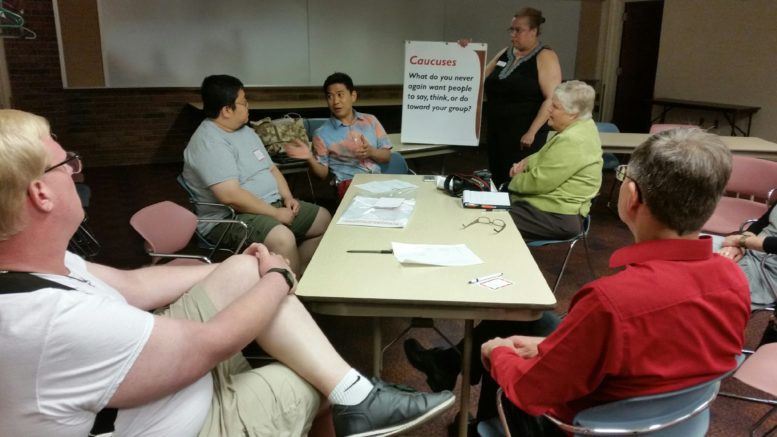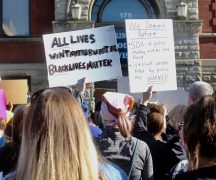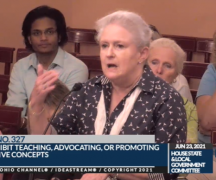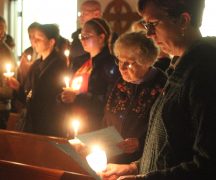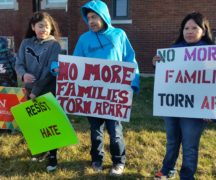By JAN LARSON McLAUGHLIN
BG Independent News
Racism. Sexism, Ageism. Classism. Those “isms” tacked onto the ends of words stand for prejudice combined with power. The words define systematic prejudice – made easier by lumping people under a label.
Earlier this month, Not In Our Town Bowling Green held another workshop at the library – this one specifically on “isms.”
Everyone at the workshop could identify as a victim of at least one “ism.” There were “foreigners” and “feminists.” There were people who stood out due to their color or their politics.
The workshop was led by Dr. Krishna Han, assistant director of the BGSU Office of Multicultural Affairs. Han, originally from Cambodia, speaks five languages. Sometimes he can’t immediately find the English word that he is searching for. So, his strength sometimes appears to be a weakness when people judge Han’s intelligence by his occasional halting English. That and the color of his skin mean that Han may forever be looked upon as a foreigner in the U.S. – no matter how many years he had been here or the fact that he is an American citizen.
“Generalization is dangerous – period,” Han said.
Han tires of hearing people say, “Worry about your own country … This is my country,” he said.
Even stereotypes that paint favorable pictures of people – such as all Asians being smart and hardworking – are harmful.
“Any stereotype is negative,” said Ana Brown, a member of NIOT and BGSU administration member.
Han asked the group to identify the hurtful comments directed to them in the past. “What do you never again want people to say, think or do toward your group?”
For Yaohan Chen, an Asian-American, it was easy.
“Go back to where you came from, or that we are not part of America and shouldn’t have a say in America,” Chen said.
Then there’s the common, “Are immigrants stealing benefits? Are they benefitting society or not?”
Margaret Montague, of NIOT, recalled a speaker originally from India being frequently asked how often he gets to go home. His answer – every day at the end of work.
“How long does someone get labeled as an immigrant?” she asked.
Some are “perpetual foreigners” because of the color of their skin. “When does it end?” Montague said.
“My family has been here longer than most, but I will always be an outsider,” Brown said.
The group also discussed those stereotyped because of their socio-economic status. Some are labeled “trailer trash,” by those who have no idea of the toll that generational poverty takes on families, Brown said.
“Poverty has become a moral failing,” with poor people often labeled as lazy and stupid, Brown said. “It takes a long time to dig out. It’s a systematic injustice.”
The women in the group listed off comments they could do without, such as “Men are the head of the household,” Montague said.
Brown recalled working as a camp counselor when being told, “The boys will gather the firewood. The girls will cut the vegetables.” The tables were turned when the boys returned with wood that could not be used.
“We can’t light green wood,” Brown told them, as she and the girls picked up dead wood from the ground. “Now the boys will wash the dishes and the girls will go play,” she told them after dinner.
“We need to look at people, instead of groups,” said Bill Herald.
People in certain groups are often called upon to represent their entire race, gender, class, age or other label.
“It’s like you have to be an ambassador whether you like it or not,” Montague said. “How tiring and lonely that must be.”
“It’s exhausting,” Han said.
Brown, who grew up black in rural Northwest Ohio, agreed. “Because I grew up with a foot in both worlds, I have a responsibility to both to build some bridges.”
Often, Americans glorify the notion of equality, but “in reality, it’s not so much,” Han said.
Some people still don’t realize that not everyone is beginning the race at the same starting line. “Privilege is when you start on third base and you think you’ve hit a home run,” Brown said.
The NIOT workshops are designed to help reduce stereotypes and discrimination.
“It isn’t about being politically correct. It’s about our blind spots,” Montague said.
The next workshop by Not in Our Town Bowling Green and the BGSU Office of Multicultural Affairs is Thursday, June 1, from 6 to 8 p.m., in the Wood County District Public Library meeting room. The topic is Safe Zone Training: A Focus on LGBTQ+ and Ally Building. The session is free and open to the public.
The workshop will provide education concerning LGBTQ+ issues and creating a positive environment for LGBTQ+ people. The purpose of the workshop is to strengthen and expand a support network of allies for the Bowling Green LGBTQ+ community. Safe Zone training is important because increasing numbers of Bowling Green community members openly identify as LGBTQ+. The political landscape has also created new challenges for LGBTQ+ persons.
To learn more about the programs and the topics, go to the Not in Our Town Bowling Green Facebook page (https://www.facebook.com/Not-In-Our-Town-Bowling-Green-411179839042009/). Posts and videos about the program topics will be included on the NIOT BG Facebook page.

